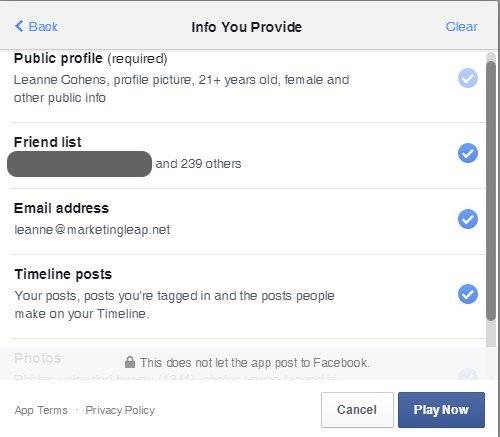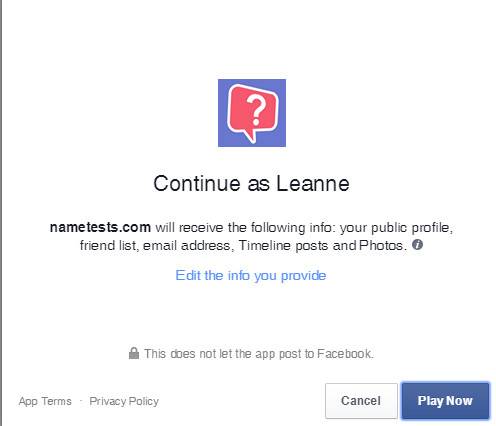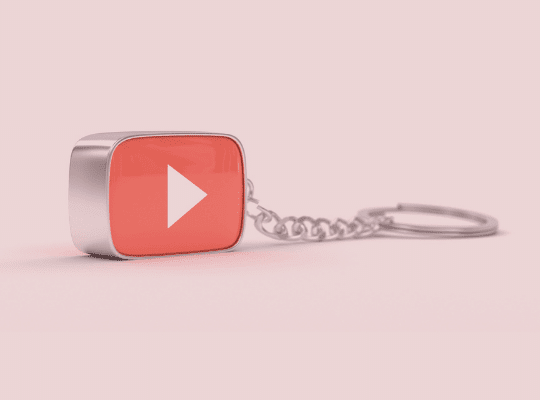In fact If You Value Your Privacy Then Don’t Do Facebook Quizzes!
 While this doesn’t directly relate to Social Media Marketing, I am watching far too many clients and friends having their Facebook accounts either hacked or duplicated. Knowledge is power, and the more you understand about your Facebook account (or any Social Media for that matter) and your privacy, the safer your personal data is.
While this doesn’t directly relate to Social Media Marketing, I am watching far too many clients and friends having their Facebook accounts either hacked or duplicated. Knowledge is power, and the more you understand about your Facebook account (or any Social Media for that matter) and your privacy, the safer your personal data is.
Facebook is simply not the place you go to if you want anonymity, but most people just don’t realise how easy it is to simply hand over a huge amount of your personal information to people and websites unknown. While most people (ok some people) understand that anything they post essentially becomes Facebook’s property, they forget it can be used in some unimaginable ways. Think of the word ‘profile’ what exactly do profilers do? They analyse an individual to form some very accurate statistics on that person. Likewise, anything you share on any social network can be used to dig up an ever-more accurate picture of who you are, where you are, what you do, what you like, and who you know.
Quizzes, personality tests, friend comparisons, all are simply black holes for personal data. Click To TweetThere are two lately that have caught unwanted attention for their very lax privacy policies. And yes, I had both of them on my personal account which is part of the reason for this blog.
 It is important to remember these sites are not acting out of the goodness of their heart by offering you endless hours of entertaining tools free of charge. The company directly and indirectly, benefits from everyone who pumps their personal details — and those of their friends and family — into them. These sites then take full advantage of this information, requesting access to you the Facebook users’ email address, photos, timeline posts, friends and more. You wouldn’t willingly hand all this information over to complete stranger would you? Yet these websites download all this private Profile information, in the full knowledge that the lure of a silly app that pumps out nonsense will be enough to persuade people to just click through without giving a thought to what granting such permission actually means.
It is important to remember these sites are not acting out of the goodness of their heart by offering you endless hours of entertaining tools free of charge. The company directly and indirectly, benefits from everyone who pumps their personal details — and those of their friends and family — into them. These sites then take full advantage of this information, requesting access to you the Facebook users’ email address, photos, timeline posts, friends and more. You wouldn’t willingly hand all this information over to complete stranger would you? Yet these websites download all this private Profile information, in the full knowledge that the lure of a silly app that pumps out nonsense will be enough to persuade people to just click through without giving a thought to what granting such permission actually means.
So what does it mean? It means that any information provided about you and your friends can be collected and sold onto advertisers. There is simply no way to know where it ends up and what, ultimately, it will end up being used for. These sites could sell the data to an advertiser — or, more likely, multiple advertisers — who could in turn sell it on to another company. The more levels of on-selling that are introduced, the less integrity there is. It’s almost like a money laundering process. Filter data through enough companies, and there is no way of knowing where it came from, but this does not in any way reduce its value.
Any information provided about you & your friends on Facebook can be collected and sold. Click To Tweet#1. Meaww.com:
They have some really amazing quizzes. I mean who wouldn’t want to know “Which friend will never let you be lonely?” or “What will be your Valentines gift be this year?” or even the wonderful “Which friend trusts you with their life?” Innocuous, harmless fun right? WRONG!
A disclaimer at the bottom of the page proclaims: “All content is provided for fun and entertainment purposes only”. Fair enough, you might think, but that’s certainly not the full story. Meaww’s privacy policy admits as much:
Please be aware that this Privacy Policy does not apply to the practices of entities Meaww does not own or control, or to individuals whom Meaww does not employ or manage, including any third parties to whom Meaww may disclose Personal Information (as defined below) pursuant to the terms and conditions of this Privacy Policy.
There is also the admission that:
Meaww processes Personal Information on its servers in many countries around the world. Such information may be stored on any of our servers, at any location.
With differing levels of security and privacy to be found around the world, this also represents a cause for concern. Meaww gives the impression of being open in its privacy policy, however your personal information could be stored anywhere.
Except as described hereunder, We do not share your Personal Information with third parties unless We have received your permission to do so, or given you notice thereof (i.e. we’ve just told you about it in this Privacy Policy), or removed your name and any other personally identifying information from it.
The company washes its hands of any responsibility for how personal data is handled. Anything could happen… it’s all out of Meaww’s control.
We are not responsible for the practices employed by any websites or services linked to or from Meaww, including the information or content contained within them. Please be aware that if you choose to use a link to go from Meaww to any third party’s website or service, such third party’s own rules and privacy policy (and not our Privacy Policy) will apply and govern your activities and any information you disclose while interacting with such third parties.
Worried yet? You should be. Think of the information you have listed on your public profile, the bands, books, movies & TV Series you’ve ‘Liked’, where you’ve lived and when. So much personal data just handed over to complete strangers that you will never know or see seems very scary to me.
#2 Most Used Words:
This “quiz,” created by a company called Vonvon.me, had risen to over 16 million shares in a matter of days. Yes I even did it, I love wordles (their official name) or beautiful word clouds and simply couldn’t help myself. It’s been written about in the Independent, Cosmopolitan, and EliteDaily. Just like Meaww’s quizzes, there are over 16 million people in a matter of days who agreed to give up almost every private detail about themselves to a company they likely know nothing about.
 The app, like many Facebook quiz apps, is a privacy nightmare. Here’s a list of the info the quiz initially requested players disclose to Vonvon.me:
The app, like many Facebook quiz apps, is a privacy nightmare. Here’s a list of the info the quiz initially requested players disclose to Vonvon.me:
- Name, profile picture, age, sex, birthday, and other public info
- Entire friend list
- Everything you’ve ever posted on your timeline
- All of your photos and photos you’re tagged in
- Education history
- Hometown and current city
- Everything you’ve ever liked
- IP address
- Info about the device you’re using including browser and language
Due to the number of articles complaining, Vonvon has reduced the number of permissions required to what you see on the image above i.e. everything above apart from your IP address & device information.
16 million people gave up almost every private detail about themselves via Most Used Words App on Facebook Click To TweetVonvon’s privacy policy leaves a lot to be desired and for those of us who have already played the quiz, there’s no take backs:
[…] you acknowledge and agree that We may continue to use any non-personally-identifying information in accordance with this Privacy Policy (e.g., for the purpose of analysis, statistics and the like) also after the termination of your membership to this WebSite and\or use of our services, for any reason whatsoever.
Your information could be stored anywhere in the world, including countries without strong privacy laws. A Whois search reveals Vonvon.me was registered in South Korea, but it operates under several languages including English, Vietnamese, Malaysian, and Korean:
Vonvon processes Personal Information on its servers in many countries around the world. Such information may be stored on any of our servers, at any location.
Based on the line below, Vonvon is free to sell your data (just like Meaww) to whoever they want for a profit, although they have stated they have no intention of doing this. Although they say they will not share personal information with third parties without permission, just by playing the quiz you’ve technically given them permission because you’re a responsible person who reads the privacy policy. You did, didn’t you?
[…] We do not share your Personal Information with third parties unless We have received your permission to do so, or given you notice thereof (such as by telling you about it in this Privacy Policy) […]
Yes, it actually says that. Worst of all, Vonvon skirts responsibility after it has given your data to third parties, who can do whatever the hell they want with it:
[…] this Privacy Policy does not apply to the practices of entities Vonvon does not own or control, or to individuals whom Vonvon does not employ or manage, including any third parties to whom Vonvon may disclose Personal Information […]
Initial Source: https://www.comparitech.com/blog/vpn-privacy/that-most-used-words-facebook-quiz-is-a-privacy-nightmare/
Once again companies and shady characters you have never met can now access your entire Facebook profile–friends, photos, statuses and all–and use them in ways you never directly agreed to. Now, I initially tried editing the permissions before proceeding with the app on Facebook, and wasn’t allowed to play the quiz, unless I still gave them access to my public profile and Facebook timeline posts. Most people that play probably won’t bother changing the access settings though.
Finally, it brings us to what isn’t exactly quiz but can be just as damaging.
#3 “type Amen and share” posts of sick children or animals:
 This post was originally written by a mother of a child who suffers from a rare skin condition called “ichthyosis”. You can read Courtney Westlakes’ full blog here. An image of her child went viral on Facebook with over 23,000 shares in a matter of weeks in December.
This post was originally written by a mother of a child who suffers from a rare skin condition called “ichthyosis”. You can read Courtney Westlakes’ full blog here. An image of her child went viral on Facebook with over 23,000 shares in a matter of weeks in December.
These posts specifically ask you to “Type Amen for this baby and share,” or “Keep scrolling if you’re heartless.” Pretty soon, sometimes even in the course of hours or a few days, that Facebook post can be seen on the walls and news feeds of thousands of presumably well-meaning people.
A stolen image of a mother's sick child went viral on Facebook with over 23,000 shares in weeks in December. Click To TweetSo why would anyone want to steal and use images of sick babies or suffering creatures without permission? Typically, because of scams like this, as detailed in this article by Consumer Affairs:
Since Facebook’s algorithms place a high value on popularity (as measured by likes and shares), these highly liked and shared pages therefore have a much higher chance of appearing in people’s “Feeds” and being seen by other Facebook users. Then, once the page has a sufficiently high popularity rating, the like-farmer either removes the page’s original content and replaces it with something else (usually malware or scam advertising); leaves the page as is and uses it as a platform for continued like-farming in order to spread malware, collect people’s marketing information or engage in other harmful activities; or outright sells the highly liked site to cyber criminals in a black market web forum.
When you engage with posts like this, you make them popular. When they’re popular, the owner of the page can then sell it to cyber criminals in black market web forums. Yes worst case scenario, but again it is your private information going out to at the very least scammers or spammers.
So, what is the point? I’ve watched too many friends panic, because a complete stranger has duplicated their profile. I also studied Market research (and have a pretty plaque on my wall for my efforts) and know how time-consuming, tedious and expensive proper market research can be. Post a clever quiz and in a matter of days you have all this data on millions of people? That’s a license to print money there. Let’s start being a little more careful with what we share online. If you’re not sure, abstinence is the best privacy policy.
Be a little more careful with what you share online.Not sure? then abstinence is the best privacy policy. Click To TweetFacebook is a haven for a large number of such companies and data miners, frankly, hasn’t done enough to educate or warn users about the risks. Social Sweethearts, a similar company to Facebook based in Germany, creates quiz apps that even collect your email address. Can anyone say spam?
So how can you protect yourself? The easiest way is to avoid online quizzes that require Facebook authentication altogether. Many of them can even hijack your Facebook and post on your behalf (although Facebook has done a lot more to stop that practice). Stick to quizzes that just let you share the results without logging in with your Facebook account, such as the ones on Buzzfeed.
If you insist on authenticating a Facebook quiz app, be sure to check the permissions and read the privacy policy or terms of use.
If you are just like me & have participated in these online games, I will show you in my next blog how to delete these apps so make sure you bookmark this page.
In the meantime, social media gives you an incredible platform to grow your business and get your Brand front and centre on people’s smartphones & computers. By understanding Social Media and online digital marketing, you can improve your interactions with your clients and build a positive image throughout the internet. As you’ve seen, it doesn’t take much for things to go viral (Grumpy Cat anyone?) Your customers talk on social media ALL the time. If you’re not sure what you need to be doing, contact me and let’s talk.





















Wow, every social media user needs to read this…
Thanks Frank please feel free to share. I had too many friends accounts duplicated due to personal information ending up on the other side of the world, which is why I wrote it. 🙂
Important information anyone tempted by these quizzes needs to see. Thanks for the detailed information!
This is absolutely something I’ve been concerned about, so I’ve avoided most of the quizzes that I’ve seen. Although, after reading this I feel I should buckle down on it even more. Great article! Thanks. I’m sharing it over on Twitter!
thanks so much for this information. I had NO idea that these quizzes were so toxic. WIll steer clear of them from now on.
Wow, glad I’m not a big quiz taker, but I have so many friends that are. . .guess my info is out there by my choice or more often by my friends choices.
Hi Brenda, thats the scary part you have no say in what information your friends share.
Geez. Thank you for sharing! Now I am empowered!
Glad to hear it Max 🙂
Crikey, I knew about the privacy issues but didn’t realise it was that bad! I’m sharing this in my June Round Up, great info!